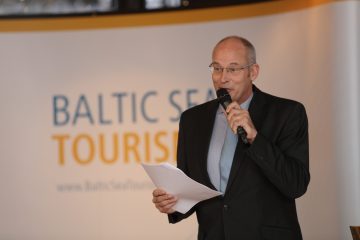Sustainable tourism cooperation in the Baltic Sea region

Gerd Lange,
Coordinator for Policy Area Tourism of the EUSBSR // Head of Tourism Unit,
Ministry of Economics,
Employment and Health Mecklenburg-Vorpommern,
Germany
With 227 million overnight stays in 2016 of which 24 percent are international visitors, two digit growth rates between 2014 to 2016, and nearly 640.000 people employed in tourism related industries, tourism belongs to one of the major economic sectors in the Baltic Sea region (BSTC Tourism Market Report “State of the Tourism Industry in the Baltic Sea region”, 2018).
Bundling the countries’ resources in order to meet common challenges and to benefit from opportunities that arise for the Baltic Sea region has been and will be crucial for a thriving and prospering region. Therefore, member states of the EU and the European Commission decided on implementing the EU Strategy for the Baltic Sea Region (EUSBSR) in 2009. The strategy aims at strengthening cooperation between the countries bordering the Baltic Sea, focusing on the main objectives: saving the sea, connecting the region and increasing prosperity. With 13 different Policy Areas and 4 Horizontal Actions, the EUSBSR fosters networks and increases the political awareness on EU level.
Since its introduction in 2009, the Policy Area Tourism (PA Tourism) is closely working together with the tourism industry in the Baltic Sea region (BSR), following the overall objective to establish the BSR as a common and coherent tourism destination. The Ministry of Economics, Employment and Health Mecklenburg-Vorpommern took over the coordination role of PA Tourism in 2014, and is now combining transnational tourism cooperation activities with regional tourism policy expertise. Serving as a forum for dialogue and exchange between national representatives of the respective member states, a Steering Committee provides advice and assistance to PA Tourism. Thus, the made progress is reflected consistently and necessary adaptations with respect to stakeholder responsibilities as well as thematic or political trends are made.
The Baltic Sea Tourism Forum aims at promoting dialogue, building consensus and sharing the vision on common challenges of sustainable tourism development in the BSR.
Closely linked to the implementation process of PA Tourism in the EUSBSR is the Baltic Sea Tourism Forum (BSTF). Founded in 2008 by the Ministry of Economics, Employment and Health Mecklenburg-Vorpommern and the Mecklenburg-Vorpommern Tourist Board, the annual event has become the communication and exchange platform for transnational initiatives in the BSR. The BSTF aims at promoting dialogue, building consensus and sharing the vision on common challenges of sustainable tourism development in the BSR. The forum attracts key tourism stakeholders from around the Baltic Sea and contributes significantly to transnational exchange and collaboration in the region. In 2018, around 350 participants followed the invitation to the 11th joint Baltic Sea and Latvian Tourism Forum in Riga / Latvia. The 12th Baltic Sea Tourism Forum is planned to be organised in Pskov / Russia from 12 – 13 November 2019.
In the frame of the annual Foras the idea of a more structured and sustainable tourism cooperation was born with a Center of Expertise at its core. The so-called Baltic Sea Tourism Center (BSTC) is supposed to constitute the central and competent contact point for tourism in the BSR providing relevant partnerships, insights and skills for the sector on macro-regional level. Moreover, the BSTC actively addresses partners, stakeholders and relevant externals in order to bring forward a sustainable, balanced and international tourism development. Additionally, it speaks with and on behalf of the tourism sector actively offering inspiration, data and needed support. The vision of the BSTC is reinforcing and uniting the voice for sustainable and competitive tourism development in the BSR. Throughout an intensive stakeholder consultation over the past years, transnational working areas such as Tourism Policies, Sustainable Tourism, Market Research and Training Offerings have been identified as very important and convene committed tourism stakeholders in newly launched Expert Groups – aiming to support the BSTC with competences and expertise in the areas addressed.
In order to make smart and innovative decisions for the future of the BSR, the BSTC published the first BSTC Market Report “State of the Tourism Industry in the Baltic Sea Region” in 2018.
In order to make smart and innovative decisions for the future of the BSR, the BSTC published the first BSTC Market Report “State of the Tourism Industry in the Baltic Sea Region” in 2018. The report provides reliable insights and figures on how the BSR has and is developing with regards to tourism. In 2019, the 2nd Market Report will be complemented by the first BSTC Trend Report – published with the aim to support smart decision making in tourism development.
The tourism industry is a major business field, not just in the BSR but all over the world. According to the UNWTO, tourist arrivals worldwide are expected to rise from the current 1.4 billion (2018) to 1.8 billion per year by 2030. These prospects put the BSR in strong competition with other macro-regions and demand for realignments of internationalisation strategies to both benefit from the positive effects and minimize the negative impacts of growing tourism flows. Together with the tourism sector, PA Tourism and the BSTC will make every possible effort to further improve more permanent cooperation patterns, provide stronger political support, and secure more stable funding opportunities especially with regard to the Multiannual Financial Framework 2021-2027 ahead.
Further information at: www.bstc.eu
Email: g.lange@wm.mv-regierung.de
Expert article 2515
